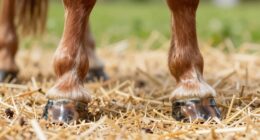Dogs can't eat acorns safely. Acorns have toxic stuff like tannins. These can cause stomach problems and kidney issues in dogs. If a dog eats green acorns, leaves, or buds, it may throw up, get diarrhea, or feel belly pain. Small dogs are more likely to get blocked intestines from eating acorns. Quick vet help is a must if your dog eats acorns to prevent lasting harm. Watch for signs such as less eating and thirst after. Stay tuned for more info on how to care for your furry friend's health.
Key Takeaways
- Acorns are toxic to dogs and can cause stomach upset, kidney failure, and other serious health issues.
- Ingesting oak leaves, buds, or green acorns can lead to vomiting, diarrhea, and abdominal pain in dogs.
- Small dogs are at higher risk of intestinal blockages from consuming acorns.
- Immediate veterinary attention is crucial if a dog eats acorns to prevent permanent damage.
- Training dogs to avoid acorns, supervising outdoor time, and prompt removal of acorns can help prevent ingestion.
Potential Risks of Acorn Consumption
When considering the safety of allowing dogs to eat acorns, it's vital to understand the potential risks associated with their consumption. Acorns contain toxic tannins that can cause stomach upset and lead to serious issues like kidney failure in dogs. Ingesting oak leaves, buds, or green acorns may result in symptoms such as vomiting, diarrhea, and abdominal pain.
Small dogs are particularly at risk of intestinal blockages from consuming acorns, which can be critical if not addressed promptly. If your dog eats acorns, immediate veterinary attention is essential to prevent permanent damage. It's important to monitor your dog for signs of illness, including dehydration and loss of appetite, after they've ingested acorns.
Being proactive and recognizing these symptoms early can help in getting your furry friend the necessary care they need to recover safely.
Symptoms of Acorn Poisoning in Dogs

Frequently, dogs that have ingested acorns may exhibit common symptoms of poisoning such as vomiting. In addition to vomiting, other signs of acorn poisoning in dogs include diarrhea, abdominal pain, loss of appetite, and dehydration. These symptoms can vary in severity depending on the amount of acorns ingested and the size of the dog. It's important to monitor your dog for these signs if you suspect they have consumed acorns. Prompt recognition of these symptoms can help in seeking timely veterinary care to prevent further complications. Here is a table summarizing the symptoms of acorn poisoning in dogs:
| Symptom | Description |
|---|---|
| Vomiting | Common sign of acorn poisoning in dogs. |
| Diarrhoea | Can occur after ingesting acorns. |
| Abdominal Pain | Dogs may experience discomfort in the abdomen. |
| Loss of Appetite | Typical sign of acorn poisoning in dogs. |
| Dehydration | Result of acorn poisoning leading to fluid loss. |
Importance of Prompt Veterinary Attention

Seek immediate veterinary attention after a dog ingests acorns to prevent potential kidney or liver damage. When a dog consumes acorns, it's crucial to get them to the vet promptly. This quick action can help in diagnosing any issues early on.
Symptoms like vomiting, diarrhea, and abdominal pain shouldn't be ignored, as they could indicate acorn poisoning. A vet can conduct tests such as blood tests or X-rays to assess the extent of the ingestion and check for blockages. In severe cases, surgery might be necessary for treatment.
Timely veterinary care can make a significant difference in a dog's recovery from acorn exposure. By acting swiftly, you not only improve the prognosis but also minimize the risk of complications arising from acorn ingestion. Remember, the sooner you seek help from a vet after suspecting your dog has ingested acorns, the better the chances for a positive outcome.
Preventing Dogs From Eating Acorns

To prevent dogs from eating acorns, train them to leave or drop the acorns using commands like 'leave it' or 'drop it.' Teaching these commands can help avoid stomach upset from ingesting acorns. Keeping yards clean of acorns and supervising dogs closely outdoors are essential steps in preventing them from munching on these potentially harmful nuts. If your dog picks up an acorn during walks, promptly remove it from their mouth to prevent ingestion.
It's important to watch for signs of gastrointestinal issues if your dog consumes acorns, such as vomiting or diarrhea. If you notice any concerning symptoms, seek veterinary advice promptly. By using commands, supervising outdoor time, and promptly removing any acorns your dog finds, you can help keep your furry friend safe from the potential dangers of acorn ingestion. Remember, prevention is key when it comes to protecting your dog's health.
Treatment Options for Acorn Toxicity

When dogs show signs of acorn toxicity, urgent veterinary treatment is necessary to address possible complications such as vomiting, diarrhea, and dehydration. Treatment options for acorn toxicity in dogs may include medication to manage symptoms like vomiting and diarrhea.
In severe cases where dehydration is a concern, rehydration through intravenous (IV) fluids may be required to restore the dog's fluid balance. Additionally, blood tests might be necessary to evaluate kidney and liver function after acorn ingestion, ensuring any issues are promptly identified and addressed.
In situations where there are concerns about intestinal blockages due to acorn consumption, X-rays or even surgery may be needed for treatment. It's essential to seek immediate veterinary attention when acorn toxicity is suspected in dogs to prevent any potential long-term damage.
Frequently Asked Questions
What Should I Do if My Dog Eats Acorns?
If our dog eats acorns, we should contact a vet immediately for advice. Acorns contain toxic tannins that can cause liver and kidney failure in dogs.
Symptoms of acorn poisoning include vomiting, diarrhea, abdominal pain, loss of appetite, and dehydration. Treatment might involve medications, rehydration, blood tests, and possibly X-rays or surgery.
To prevent acorn ingestion, we should avoid encouraging play with acorns, offer distractions with toys, teach drop or leave commands, and watch for signs of illness after walks.
How Many Acorns Can a Dog Eat Before Getting Sick?
We can become sick from eating acorns equivalent to 6% of our body weight. Green acorns are more toxic than brown ones to us. Larger acorn caps contain more acid, posing a higher risk of toxicity.
Symptoms of acorn poisoning include vomiting, diarrhea, lethargy, drooling, and loss of appetite. Swallowing whole acorns can lead to intestinal obstruction.
Be cautious with acorns around us to prevent health issues.
Can Dogs Eat Walnuts and Acorns?
We must avoid giving dogs walnuts and acorns as they can be harmful. These foods contain toxic compounds that can lead to health issues like gastrointestinal upset, organ damage, and choking hazards.
Keeping walnuts and acorns away from dogs to prevent any potential poisoning is crucial. Let's prioritize our furry friends' well-being by ensuring they steer clear of these dangerous treats.
Are Oak Trees Poisonous to Dogs?
Yes, oak trees are toxic to dogs. All parts of oak trees, including acorns, contain harmful tannins that can lead to severe symptoms like vomiting, diarrhea, and dehydration. Ingesting oak tree parts may even cause liver and kidney failure in dogs, with small dogs at risk of intestinal blockages.
If a dog consumes any part of an oak tree, immediate veterinary attention is essential to prevent serious health issues.
Conclusion
To wrap up, it's crucial to keep our furry friends safe from the potential dangers of acorn consumption. Keep in mind, symptoms of acorn poisoning in dogs can be severe and require immediate veterinary attention.
By safeguarding dogs from eating acorns and being conscious of the risks, we can help guarantee their well-being. If you suspect your dog has ingested acorns, don't hesitate to seek professional help to assure their health and safety.









